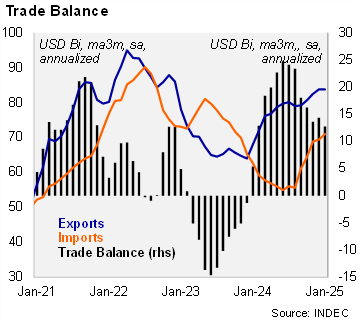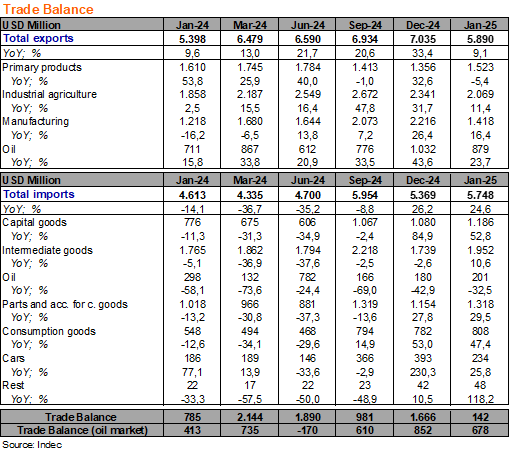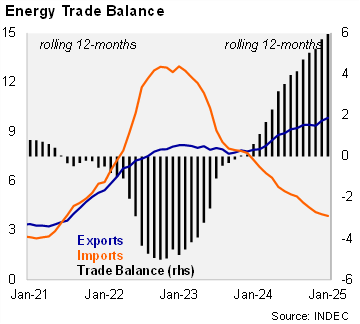The trade balance reached a surplus of USD 0.1 billion in January, well below the USD 0.8 billion surplus registered in the same month of 2024. The surplus was above market expectations according to the central bank's survey, with analysts estimating a surplus of USD 0.7 billion. The 12-month rolling trade balance fell to a surplus of USD 18.2 billion in January, down from USD 18.9 billion in the previous month. At the margin, the seasonally-adjusted annualized trade balance fell to a surplus of USD 12.8 billion in January, from a surplus of USD 14.4 billion in the previous month.

Exports increased in the quarter ended in January, still driven by the agricultural sector. Total exports rose by 24.4% yoy in the period, following a 31.7% gain in 4Q24. Agricultural exports, including manufactured agricultural products, expanded by 27.3% yoy in the period (from 42.8% yoy in 4Q24). Exports of other industrial products rose by 19.6% yoy in the same period, led by metals (down from an increase of 21.3% yoy in 4Q24). On a sequential basis, exports rose by 16.2% qoq/saar in January.
Imports rose in the quarter ended in January, in line with the recovery of activity and a stronger currency. Total imports rose by 14.0% yoy in the period (from a drop of 7.5% yoy in 4Q24) and by 47.5% qoq/saar in January. Imports of capital goods increased by 27.0% yoy in the quarter ended in January, while imports of consumer goods (including cars) rose by 55.9% yoy. On the other hand, imports of intermediate goods fell by 2.6% yoy in the period, from a drop of 2.7% yoy in 4Q24.

The energy trade surplus widened further in January. The rolling 12-month balance reached USD 6.0 billion in January, from a surplus of USD 5.7 billion in the previous month and only USD 0.6 billion in same month one year ago. Energy imports plummeted by 32.5% yoy in January, while oil exports rose by 23.7% yoy in the same period.

Our take. For 2025 we expect a trade surplus of USD 12.0 billion driven by lower commodity prices and higher imports consistent with a recovery in economic activity and stronger currency. Of note, the lack of rain at a critical time for the harvest poses risks of a possible drought.
